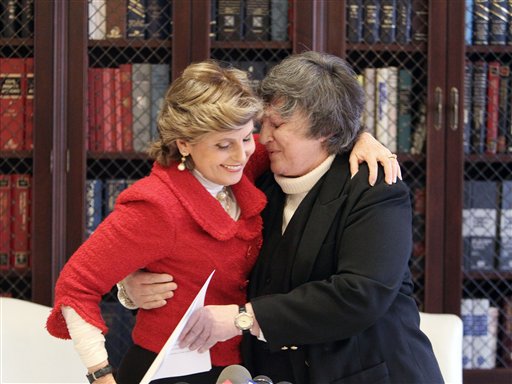SAN FRANCISCO — Same-sex marriage moved one step closer to the U.S. Supreme Court on Tuesday when a federal appeals court ruled California’s voter-approved ban unconstitutional, saying it serves no purpose other than to “lessen the status and human dignity” of gays.
A three-judge panel of the 9th Circuit Court of Appeals gave gay marriage opponents time to appeal the 2-1 decision before ordering the state to allow same-sex weddings to resume.
Six states allow gay couples to wed — Connecticut, New Hampshire, Iowa, Massachusetts, New York and Vermont, as well as the Washington capital district. California, as the nation’s most populous state and home to more than 98,000 same-sex couples, would be the gay rights movement’s biggest prize of them all.
The appeals court focused its decision exclusively on California’s ban, not the bigger debate, even though the court has jurisdiction in nine Western states.
Whether same-sex couples may ever be denied the right to marry “is an important and highly controversial question,” the court said. “We need not and do not answer the broader question in this case.”
Legal analysts questioned whether the Supreme Court would agree to take the case because of the narrow scope of the ruling. California is the only state to grant gays the right to marry and rescind it.
The ban known as Proposition 8 was approved by voters in 2008 with 52 percent of the vote. The court said it was unconstitutional because it singled out a minority group for disparate treatment for no compelling reason.
The justices concluded that the law had no purpose other than to deny gay couples marriage, since California already grants them all the rights and benefits of marriage if they register as domestic partners.
The measure “serves no purpose, and has no effect, other than to lessen the status and human dignity of gays and lesbians in California, and to officially reclassify their relationships and families as inferior to those of opposite-sex couples,” Judge Stephen Reinhardt, one of the court’s most liberal judges, wrote in the 2-1 opinion. The lone dissenting judge insisted that the ban could help ensure that children are raised by married, opposite-sex parents.
“I’m ecstatic. I recognize that we have a ways to go yet. We may have one or two more legal steps,” said Jane Leyland, who was gathered with a small crowd outside the federal courthouse in downtown San Francisco, cheering as they learned of the ruling.
Leyland married her longtime partner, Terry Gilb, during the five-month window when same-sex marriage was legal in California.
Opponents of gay marriage planned to ask the Supreme Court to overturn the ruling, which came more than a year after the appeals court panel heard arguments in the case.
“We are not surprised that this Hollywood-orchestrated attack on marriage — tried in San Francisco — turned out this way. But we are confident that the expressed will of the American people in favor of marriage will be upheld at the Supreme Court,” said Brian Raum, senior counsel for the Alliance Defense Fund, a Christian legal aid group based in Arizona that helped defend Proposition 8.
Weddings appeared unlikely to resume anytime soon. The ruling will not take effect until the deadline passes in two weeks for Proposition 8’s backers to appeal to a larger panel of the 9th Circuit. Lawyers for the coalition of conservative religious groups that sponsored the measure said they have not decided if they will seek a 9th Circuit rehearing or file an appeal directly to the Supreme Court.
The panel also said there was no evidence that former Chief U.S. Judge Vaughn Walker was biased and should have disclosed that he was gay and in a long-term relationship with another man.
Proposition 8 backers had asked the 9th Circuit to set aside Walker’s ruling on constitutional grounds and because of the judge’s personal life. It was the first instance of an American jurist’s sexual orientation being cited as grounds for overturning a court decision.
Walker publicly revealed he was gay after he retired. Supporters of the gay marriage ban argued that he had been obliged to previously reveal if he wanted to marry his partner. The 9th Circuit held a hearing on the conflict-of-interest question in December.
In its ruling Tuesday, the panel majority said it was unreasonable to presume a judge cannot apply the law impartially just because he is a member of the minority group at issue in a case.
Copy the Story LinkSend questions/comments to the editors.




Success. Please wait for the page to reload. If the page does not reload within 5 seconds, please refresh the page.
Enter your email and password to access comments.
Hi, to comment on stories you must . This profile is in addition to your subscription and website login.
Already have a commenting profile? .
Invalid username/password.
Please check your email to confirm and complete your registration.
Only subscribers are eligible to post comments. Please subscribe or login first for digital access. Here’s why.
Use the form below to reset your password. When you've submitted your account email, we will send an email with a reset code.